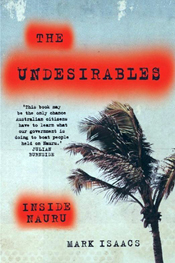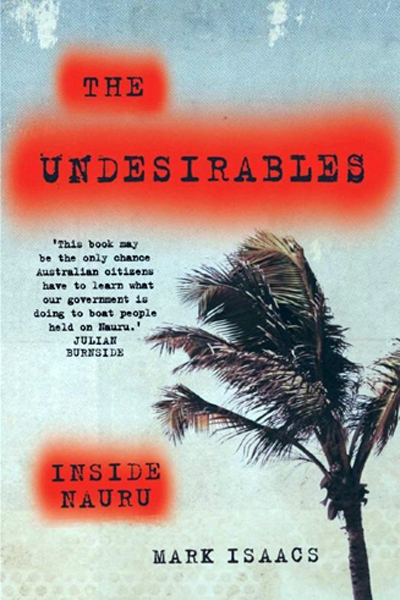
- Free Article: No
- Contents Category: Politics
- Review Article: Yes
- Article Title: The recipe for breaking a spirit
- Online Only: No
- Custom Highlight Text:
After an explosion that killed five asylum seekers and injured dozens more on a boat moored at Ashmore Reef in 2009, Prime Minister Kevin Rudd described people smugglers as ‘the absolute scum of the earth’ and ‘the vilest form of human life’. Further tragedies at sea during the ‘fifth wave’ of boat arrivals to Australia provoked similar outbursts from politicians across the political spectrum.
- Book 1 Title: Confessions of a People-Smuggler
- Book 1 Biblio: Scribe, $24.99 pb, 182 pp
- Book 2 Title: The Undesirables
- Book 2 Subtitle: Inside Nauru
- Book 2 Biblio: Hardie Grant Books, $29.95 pb, 351 pp
- Book 2 Cover Small (400 x 600):

- Book 2 Cover (800 x 1200):

- Book 2 Cover Path (no longer required): /images/October_2014/The%20Undesirables%20-%20colour.jpg
The back-story of Amiri’s involvement in smuggling reveals the complexity of the issues at play. Amiri’s family, members of the Hazara ethnic group, fled persecution in Afghanistan when he was very young. He grew up in the Pakistani city of Quetta. In recent years, the Sunni extremist group Lashkar-e-Jhangvi has, with seeming impunity, launched a campaign of terror against Hazaras in Quetta, who are Shia Muslims and easily identified by their East Asian appearance. In such circumstances, Amiri, like hundreds of other Hazara, felt he had no future in Pakistan and set out for Australia, hoping to eventually bring his family to join him.
Amiri had been living in Indonesia for more than two years when he was arrested for people smuggling. Early in his stay, Amiri made an error of judgement when he attempted to help prise some friends from immigration detention. An Indonesian called Bambang, claiming connections with government officials, promised to secure their release at a cost of $3,500 a head. Amiri gathered the necessary money from his friends’ relatives and handed it over, but when Bambang failed to deliver on his pledge, Amiri’s friends accused him of pocketing the cash himself.
With his application for refugee status rejected by the UNHCR in Jakarta (because, he says, he could not prove he was an Afghan national), with no funds left, and with his family back in Pakistan being pressured under threat of violence to repay the money defrauded by Bambang, Amiri began working for smugglers to buy his way out of trouble. He also felt responsible for the lost money. Amiri hoped to pay back the debt and then save up enough to purchase a spot on a boat to Australia. When his Indonesian girlfriend fell pregnant, his plans changed again. They married and Amiri gave up on ideas of Australia, determined, as he puts it, ‘to fulfil my obligations arising out of my love and marriage and my wife’s pregnancy’.
 Dawood Amiri in Court, Jakarta (image courtesy of AAP Image/Oscar Siagian)
Dawood Amiri in Court, Jakarta (image courtesy of AAP Image/Oscar Siagian)
Already fluent in Urdu, Farsi, and English, Amiri was a quick study in Indonesian, and well equipped to play the role of intermediary between the boat organisers and their potential passengers. He used mobile phones to recruit via family and friends in Indonesia, Australia, Pakistan, Afghanistan, Iran, and beyond.
His confessions provide revealing insights into how the smuggling trade operates, including a detailed breakdown of where the money flows. He describes, for example, how ‘on-duty immigration officials still wearing their uniforms’ guide asylum seekers through Jakarta’s Soekarno-Hatta airport and deliver them directly to smugglers’ agents waiting in a car park. Amiri also conducts one of his most lucrative and successful passenger recruitment drives via mobile phone from his prison cell.
While he did not set out to be a people smuggler, and having vowed never to be involved in the trade again, Amiri has few qualms about his activities. He says the work made him happy because he was ‘helping so many asylum seekers in need’, and that he often managed to negotiate discounts with ‘the greedy smugglers’ for passengers who could not afford the full fare. In return, he says, those asylum seekers ‘added me to their prayers and gave me a gift of $100’. After his arrest, his smuggling ‘victims’ showed their continuing gratitude by wiring money from Australia to help him provide for his wife and newborn son.
Asylum seekers ‘want to be smuggled’, writes Amiri, and the smugglers are ‘the people who help asylum-seekers the most’, yet he grieves ‘deep inside’ for those lost at sea and acknowledges that he has ‘the blood of 96 people on [his] head’. While some of Amiri’s arguments are self-serving, and some of his choices questionable, it is hard to cast him as the absolute scum of the earth.
When the Gillard government reintroduced the offshore detention and processing of asylum seekers, its stated aim was to smash the people smugglers’ business model. Under the ‘no advantage’ policy, asylum seekers would have no incentive to get on a boat from Indonesia, because they would be sent to Nauru or Papua New Guinea rather than Australia, with no idea how long it would take for their protection claims to be determined or of where they might eventually end up.
Whether resuming offshore detention had this deterrent effect is questionable: boat arrivals continued until Tony Abbott used the navy to force asylum seekers back to Indonesia (as John Howard did before boats stopped coming after the Tampa affair in 2001).
What offshore processing does smash is the physical and mental health of human beings. Mark Isaacs went to work in Nauru in October 2012 soon after the Gillard government first reopened a detention centre on the island. Naïve and well intentioned, he was employed by the Salvation Army to provide support to the asylum seekers. In his formal role he provided welcome distraction from the oppressive heat, mind-numbing boredom, and aimlessness of camp life by organising soccer games, cricket matches, singing classes, concerts, jogging groups, and excursions to the beach. When he managed to take a group of Iranians swimming in Nauru’s boat harbour, Isaacs saw them at last ‘showing themselves as men, rather than caged animals’.
 One of the many boats arriving to Australia (photo courtesy of Mark Isaacs)
One of the many boats arriving to Australia (photo courtesy of Mark Isaacs)
Isaacs’ informal but perhaps more vital role is as a conversation partner, listener, and ultimately friend to the detainees. In his five rotations to Nauru over nine months, he watches the steady deterioration of their well-being as he witnesses repeated hunger strikes, acts of self-harm, suicide attempts, and riots. The detainees are quick to recognise that camp management, the Nauruan and Australian governments, and the Australian media always ignore peaceful protests and polite written complaints. As one asylum seeker puts it to Isaacs, it is only when ‘we act badly’ that we get any attention. This can work at an individual as well as a collective level. When ‘the loudest and most confrontational men in the camp’ are ‘rewarded with attention’, this encourages more aggressive behaviour and increases tension.
Within a few days, Isaacs is disabused of the idea that the asylum seekers ‘should be grateful to be in Nauru’, because they are ‘safe’ from persecution in their homeland: ‘I didn’t think any men were safe from harm within those fences.’ There is no reason to think anything has improved in the fifteen months since he left. At the time Isaacs worked in the Topside Camp, only men were detained there. The 1146 asylum seekers held on Nauru today include 268 women and 183 children.
The real purpose of Nauru is not ‘protecting people by dissuading them from taking boats across dangerous seas’, Isaacs concludes, but creating an environment ‘worse than the oppression … suffered in their home countries’ so that they are induced to opt for ‘voluntary’ repatriation.
 Mark Isaacs (photograph by Nick Moir)
Mark Isaacs (photograph by Nick Moir)
Isaacs is plagued by ethical doubts about his role: should he be doing this job, or is he helping to prop up an unjust system? He comforts himself that small, everyday acts of humanity and friendship are a salve to the detainees’ suffering and do help to reduce harm. In the end, however, despite confidentiality agreements and threats of legal action, he decides that he has to tell the truth about Nauru, to reveal the ‘recipe of how to break a man’s spirit, how to drive a desperate man so far into the dust that he destroys his own future’.
It is Isaacs’s own truth – anecdotal and subjective – but that makes it all the more compelling. The power of both these books lies in their particularity and the evidence of individual experiences. As Isaacs writes, ‘people are not statistics’.


Comments powered by CComment